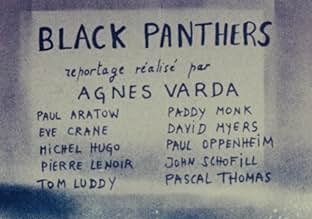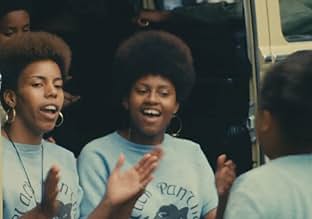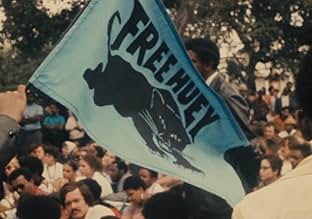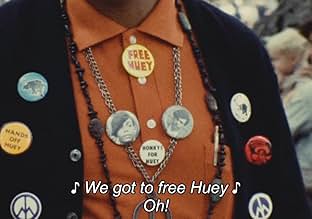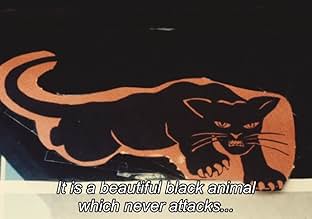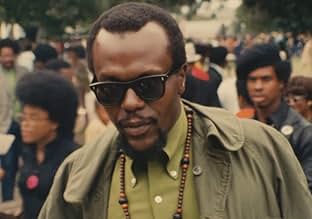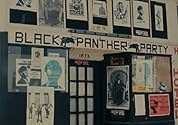IMDb-BEWERTUNG
7,4/10
2919
IHRE BEWERTUNG
Füge eine Handlung in deiner Sprache hinzuA short film of interviews and protests at a rally to free Huey P. Newton.A short film of interviews and protests at a rally to free Huey P. Newton.A short film of interviews and protests at a rally to free Huey P. Newton.
H. Rap Brown
- Self
- (Nicht genannt)
Ron Dellums
- Self
- (Nicht genannt)
James Forman
- Self
- (Nicht genannt)
Bobby Seale
- Self
- (Nicht genannt)
Empfohlene Bewertungen
I've been deeply impressed by earlier work by Varda; when this happens with me the filmmaker's whole journey becomes a lifelong project. I have several of these running, open-ended affairs with creative, alert souls who I know I can always turn to for a far- reaching view.
This is a small snapshot, but no less part of the journey. It's among a few political films she did at the same time as Godard and others, with Vietnam booming in the distance.
It's a look at a rally party of the Black Panthers at the time of Huey Newton's trial for the murder of a policeman, but there's nothing more they can offer Varda's camera than sloganeering and Varda had no more time to devote into it, perhaps not the inclination to probe more and inquire. Possibly she was interested in no more than this glimpse in passing.
It says something that she was there of course, yet she also makes it a point to ask some of the rapt faces if they know Huey didn't do it; they don't, but they're fervent just the same, it's all part of a war being waged on them, Huey is a prisoner of that war, he must go free, or else.
There's a much more sobering history prior to and as we move away from that day, based on what little I know; the obsession with territory and tribal law, and on the other hand police abuse and a youthful life without prospects that would turn Southcentral LA into Beirut, but you have to remind yourself that this is all simmering behind the ideology and parades, the image barely able to contain a life that would soon spill from it.
Politics are thin, but maybe it is all here anyway for you to deepen? Politics aside, the glimpse is worthwhile. It's a day in that life, that place, that furor about injustice.
This is a small snapshot, but no less part of the journey. It's among a few political films she did at the same time as Godard and others, with Vietnam booming in the distance.
It's a look at a rally party of the Black Panthers at the time of Huey Newton's trial for the murder of a policeman, but there's nothing more they can offer Varda's camera than sloganeering and Varda had no more time to devote into it, perhaps not the inclination to probe more and inquire. Possibly she was interested in no more than this glimpse in passing.
It says something that she was there of course, yet she also makes it a point to ask some of the rapt faces if they know Huey didn't do it; they don't, but they're fervent just the same, it's all part of a war being waged on them, Huey is a prisoner of that war, he must go free, or else.
There's a much more sobering history prior to and as we move away from that day, based on what little I know; the obsession with territory and tribal law, and on the other hand police abuse and a youthful life without prospects that would turn Southcentral LA into Beirut, but you have to remind yourself that this is all simmering behind the ideology and parades, the image barely able to contain a life that would soon spill from it.
Politics are thin, but maybe it is all here anyway for you to deepen? Politics aside, the glimpse is worthwhile. It's a day in that life, that place, that furor about injustice.
I hadn't seen any of Agnes Varda's films until I caught The Gleaners and I a few months ago at a film festival. I loved it, mainly because of Varda's extremely personal aproach to some interesting material and questions. I was recently doing some research on sixties activism when I stumbled across Black Panthers, Varda's 1968 documentary about the Black Panther Party.
The 30 minute long film looks at a rally to free the party's leader, Huey P. Newton. There's no pretense of objectivity -- the Black Panther Party shared in the copyright. Speakers at the rally included Bobby Seale, Stokely Carmichael, and H. Rap Brown, and there's also a short interview with Newton, in prison. Other segments include white people at a firing rage (some of which are children), and members of the police department explaining the gear they carry in the trunks of their cars.
This film documents some of the most important and controverial black leaders of the late 60s, and is a must see for anyone interested in sixties radicalism ot the Panthers.
The 30 minute long film looks at a rally to free the party's leader, Huey P. Newton. There's no pretense of objectivity -- the Black Panther Party shared in the copyright. Speakers at the rally included Bobby Seale, Stokely Carmichael, and H. Rap Brown, and there's also a short interview with Newton, in prison. Other segments include white people at a firing rage (some of which are children), and members of the police department explaining the gear they carry in the trunks of their cars.
This film documents some of the most important and controverial black leaders of the late 60s, and is a must see for anyone interested in sixties radicalism ot the Panthers.
The Black Panthers are organizing in Oakland to rally for Huey P. Newton's freedom. He and Bobby Seale had used their second amendment freedom to monitor the police force which was well-known to be oppressive. It talks about the killing of an unarmed young black man by the police. It's a documentary of the black power movement of that time. It sounds very familiar. There are differences. It's a bigger movement today and a more wide-spread one. Back in the day, the mostly black movement has to deal with the Vietnam war but most other issues remain the same. There is a bending toward justice over the years and it's always interesting to see the progression.
While her husband Jacques Demy was in L. A. filming MODEL SHOP (1969), Agnes Varda was in Oakland Directing this Documentary short centered on the protests trying to free Black Panther leader Huey Newton (who is interviewed in prison). The resulting film is an interesting 'you are there' look at the group.
Varda and her team got incredible access to document the group (and not just their protests). Members speak directly to the camera and without filter. There is no question that Varda's sympathies lie with the Panthers. An unidentified American woman narrates (surprising that her name has never been revealed). It's simple and straightforward, but, always tilted in favor of the group.
Originally, this was supposed to air on French TV, but, the government got cold feet over the incendiary image of the Panthers and didn't broadcast it. The short has been beautifully restored and looks and sounds fantastic. The 16mm footage retains it's verite feel, but, the restoration is so fine one swears it could be 35mm.
Streaming on Criterion and other outlets; Also available on DVD.
Varda and her team got incredible access to document the group (and not just their protests). Members speak directly to the camera and without filter. There is no question that Varda's sympathies lie with the Panthers. An unidentified American woman narrates (surprising that her name has never been revealed). It's simple and straightforward, but, always tilted in favor of the group.
Originally, this was supposed to air on French TV, but, the government got cold feet over the incendiary image of the Panthers and didn't broadcast it. The short has been beautifully restored and looks and sounds fantastic. The 16mm footage retains it's verite feel, but, the restoration is so fine one swears it could be 35mm.
Streaming on Criterion and other outlets; Also available on DVD.
For any younger person such as myself who wasn't alive during the 60's and it's numerous radical movements, "Black Panthers" is a good historical piece of film. Vardas is definitely not objective here and is clearly rooting for the Black Panthers, but I can't really blame her when the opposition is the FBI and Oakland police.
Behind all the dry summaries and articles about the Black Panthers is a truly revolutionary spirit of an oppressed people. This film does a wonderful job capturing that spirit during one of the more important times for the Black Panthers, which was the trial of Huey Newton. I especially appreciated the extended interview of Huey Newton himself while he was in jail, footage of the underappreciated Stokely Carmicheal who was one of the more intellectual figures, and the focus on woman in the Black Panther party.
I wish there was more of a focus on differing parties in the movie, like the cops or white reactionaries. Not so the film could claim to be objective but because the claims of the Black Panthers (racism, fascism,etc.) could be shown as context for their rallies. In addition, there isn't much actual filmmaking shown here, just that a team was present. I would suggest the amazing "Harlan County" for a documentary that shows the spirit and soul of the movement, not just by showing up, but through filmmaking skills.
Overall it's a good visualizer of an interesting and important part of radical history in the U.S.
Behind all the dry summaries and articles about the Black Panthers is a truly revolutionary spirit of an oppressed people. This film does a wonderful job capturing that spirit during one of the more important times for the Black Panthers, which was the trial of Huey Newton. I especially appreciated the extended interview of Huey Newton himself while he was in jail, footage of the underappreciated Stokely Carmicheal who was one of the more intellectual figures, and the focus on woman in the Black Panther party.
I wish there was more of a focus on differing parties in the movie, like the cops or white reactionaries. Not so the film could claim to be objective but because the claims of the Black Panthers (racism, fascism,etc.) could be shown as context for their rallies. In addition, there isn't much actual filmmaking shown here, just that a team was present. I would suggest the amazing "Harlan County" for a documentary that shows the spirit and soul of the movement, not just by showing up, but through filmmaking skills.
Overall it's a good visualizer of an interesting and important part of radical history in the U.S.
Wusstest du schon
- WissenswertesThis film is included in "Eclipse Series 43: Agnès Varda in California", released by Criterion.
- Zitate
Narrator: The panther was chosen as their symbol. It is a beautiful black animal which never attacks, but, defends itself ferociously.
- VerbindungenFeatured in Berkeley in the Sixties - Die Geburt der 68er Bewegung (1990)
Top-Auswahl
Melde dich zum Bewerten an und greife auf die Watchlist für personalisierte Empfehlungen zu.
Details
Zu dieser Seite beitragen
Bearbeitung vorschlagen oder fehlenden Inhalt hinzufügen

Oberste Lücke
By what name was Black Panthers - Black is Honest and Beautiful... (1968) officially released in India in English?
Antwort
